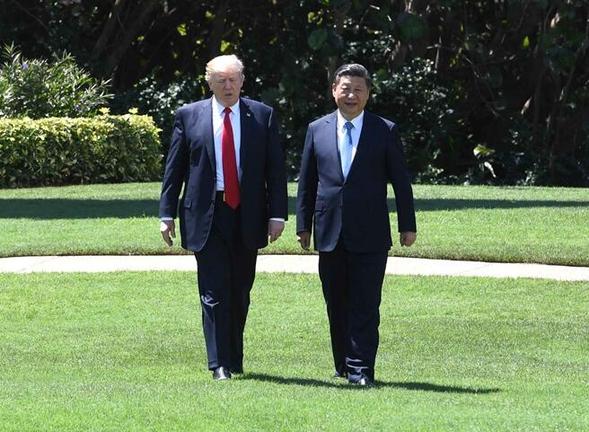First Xi-Trump summit sets the foundation for stronger ties
china.org.cn / chinagate.cn by Jon Taylor, April 13, 2017 Adjust font size:
"There are a thousand reasons to make the Sino-U.S. relationship work, and no reason to break it." – President Xi Jinping
The now concluded first summit meeting between Chinese President Xi Jinping and U.S. President Donald Trump surpassed the low expectations that had been set for it by some Western opinion leaders and analysts.
|
|
|
Chinese President Xi Jinping walks with U.S. President Donald Trump after a second round of meetings at the Mar-a-Lago resort in Florida, April 7, 2017. The two discuss bilateral cooperation during their stroll. [Photo/Xinhua] |
While they suggested that the meeting was far too soon into Trump's presidency and could potentially risk damaging relations between the two countries, by any real measure the meeting of the leaders of the world's two most important nations was a success.
While many expected Trump to demonstrate much of the same bluster and rhetoric that he employed during his presidential campaign, he chose instead to handle himself in a statesman-like manner, with no real mistakes in diplomatic protocol and some genuinely personal interactions with Xi.
There is arguably no more important relationship between countries in the 21st century than the one between China and the United States. What transpires between China and the U.S. – and its leaders – has global implications.
Because mutual trust is a prerequisite for cooperation and the foundation for friendship between China and the U.S., establishing a personal relationship between Xi and Trump – getting them to know each other – was one of the most significant aspects of the summit. That was accomplished by the two leaders.
China-U.S. relations have been broadly defined for over four decades by cooperation, and when interests diverge, the ability to rise above differences, avoid confrontation, and seek common ground has been the key to perpetuating stable and friendly relations. The meeting between President Xi and President Trump demonstrated that neither confrontation nor contention is inevitable between the two nations or their leaders.
In many respects, this meeting was an "ice breaker" and another "handshake across the Pacific" like other China-U.S. leadership interactions. Many on both sides were watching how Xi and Trump would interact. Would they dislike each other? Would there be some social media gaffe or tirade by Trump? Would there be some unexpected point of contention that would derail attempts at cooperation and consensus?
Fortunately, none of those worrisome issues occurred and the summit was rightly hailed as a success. The meeting was both positive and fruitful because it laid the groundwork for further cooperation and constructive dialogue between Xi and Trump and for China-U.S. relations going forward.
But this ice breaker was not about the two leaders sitting around talking about football or enjoying Trump's grandchildren recite poetry or sing classical Chinese songs in Mandarin. The current scope of China-U.S. relations is multileveled and complicated.
The meeting between Xi and Trump was marked by more than seven hours of in-depth and frank discussions about their current domestic and diplomatic priorities and the leaders exchanged views on hot-button regional issues such as trade, the South China Sea, and the DPRK's nuclear weapons program.
And, contrary to some reports that the meeting did not yield any substantive agreements, China and the U.S. agreed to build a new cooperation mechanism on diplomacy, security, trade, economics, law enforcement, cybersecurity, and people-to-people exchanges, which will replace the Strategic and Economic Dialogue (S&ED) and the Consultation on People-to-People Exchange (CPE).
Additionally, positive discussions occurred over improving the existing military notification mechanism, the creation of a cooperative priority list for initiatives such as advancing a China-U.S. Bilateral Investment Treaty (BIT), and cooperation in infrastructure construction, and in energy exploration.
The establishment of a good working relationship and personal friendship between Xi and Trump can drive China-U.S. relations in a positive direction by enhancing dialogue between the two countries as they deal with specific problems at the working level and finalize a constructive road map for the enhancement of bilateral relations.
The summit underscored the fact that both China and the U.S. are pragmatic, prudent, and understand the importance of a stable and predictable relationship. Neither wants trouble. Rather, both want stability. The issues between them, while sometimes difficult and complicated, can be managed.
China-U.S. relations can be positive, or as Xi Jinping is fond of saying, it can be a "win-win" relationship. This summit showed that there are a number of positive steps and efforts underway in China-U.S. relations. While there is much left to do and some pitfalls to avoid, the Xi-Trump meeting provided an opportunity to develop a clear and realistic path for cooperation and consensus.
Overall, the summit was a success and set the tone for future Xi-Trump interactions. The summit's success can best be summed up in one phrase: mutual benefit, mutual respect for core interests.
As President Xi succinctly noted "we have built trust, friendship, and a working relationship." For his part, President Trump noted that he has a very strong relationship with President Xi and that the two men have already developed a friendship. Developing in-depth channels of communication between Xi and Trump can only serve to enhance common understanding and deepen both the China-U.S. working relationship and friendship.
Dr. Jon R. Taylor is a Professor of Political Science and Chair of the Department of Political Science at the University of St. Thomas in Houston.
